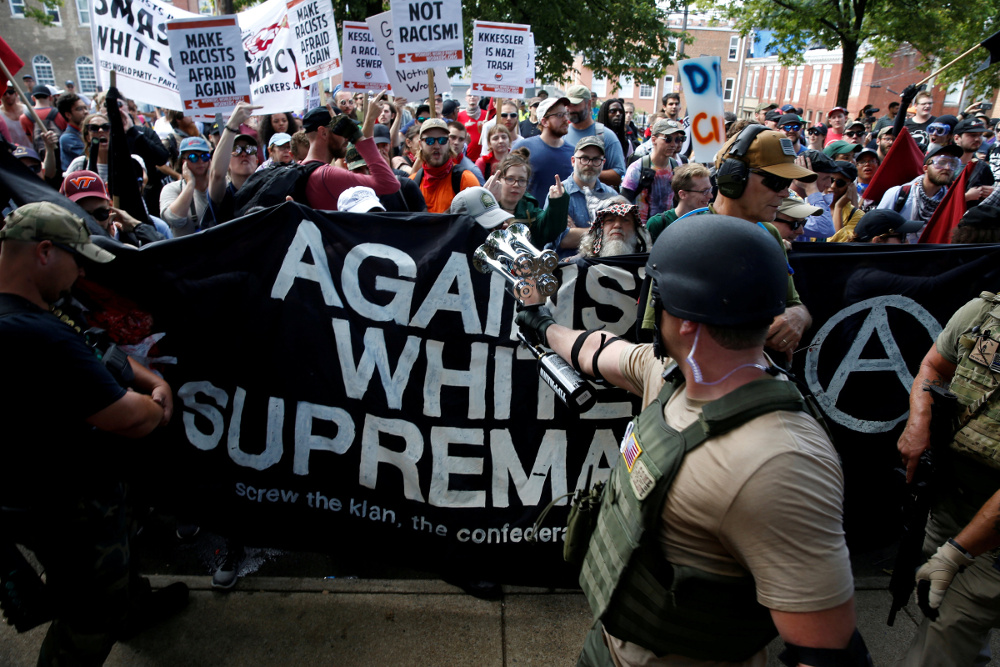
White nationalists are met by counter-protesters in Charlottesville, Virginia, Aug. 12 during a demonstration over a plan to remove the statue of a Confederate general from a city park. (CNS/Reuters/Joshua Roberts)
The post-Charlottesville conversation, at least among white people and institutions, exposed deep contradictions within U.S. democracy. As the U.S. Catholic bishops draft a pastoral letter on racism due to be released in November 2018, how will the United States Conference of Catholic Bishops prepare white Catholics to take responsibility for our complicity in the sin of white supremacy?
The church will find it difficult to begin this pastoral work because it has yet to fully address its complicity in centuries of encrusted lies.
Consider how the original purveyor of the birther movement attained the highest elected office. As Ta-Nehisi Coates details in his essay "The First White President" in The Atlantic, President Donald Trump won every white demographic. Coates summarizes his use of Pew, Gallup and Edison Research data: "Trump assembled a broad white coalition that ran the gamut from Joe the Dishwasher to Joe the Plumber to Joe the Banker." He won Mary the Dishwasher, the Plumber and Banker too, albeit by lesser margins. And against those who would claim that he won primarily by the white working class, Trump's strongest support and approval is from people who make about $81,000, who are employed, and who live in predominantly white zip codes.
The white nationalist candidate won by feeding off and fueling white resentment and racial grievance with a good dose of help from Russian interference and voter suppression. In her recent book White Rage, historian Carol Anderson unveils how white resentment feeds on the "fantasy of being under siege and having to fight back." At the same time, we ignore the long history of mass lynching and the destruction of formerly thriving black communities, as attested to in many places, such as Colfax, Louisiana, in 1873; Wilmington, North Carolina, in 1898; Ocoee, Florida, in 1920; and Tulsa, Oklahoma, in 1921.
One would be hard pressed to find white commentators recalling this history post-Charlottesville, much less grappling with its enduring significance for American democracy and the church. People of peace and justice, however, can take up the invitation of the Alabama-based nonprofit Equal Justice Initiative by participating in, and contributing to, their new memorial to victims of lynching across 800 U.S. counties.
Consider the odd conversation that ensued in the wake of the August "Unite the Right" rally in Charlottesville, Virginia, which was organized to protect a statue of Confederate Gen. Robert E. Lee and resulted in the murder of Heather Heyer. The president said there were people "on many sides" who committed violence. He asked: "George Washington was a slave owner. … Are we going to take down statues to George Washington? How about Thomas Jefferson? … Because he was a major slave owner. Now, are we going to take down his statue?"
Many commentators rightfully came to the defense of the founding fathers. While we can recognize that there was a false equivalency between Confederate leaders who threw the nation into war to defend slavery and the founding fathers, I think too many commentators, including the U.S. Catholic bishops, missed a more critical reality.
As they have done in the past, the bishops condemned racism and white supremacy but provided little description of what those terms mean in 2017. That leaves white Catholics with the prevalent and erroneous assumption that racism is only about individuals who overtly convey negative attitudes against people of another race. Condemnation completely fails to address how good white people have long been — and continue to be — complicit in a host of practices and public policies that benefit them to the detriment and devastation of African-American, Latino and First American communities.
Advertisement
We have never fully confronted white complicity as a church. As historian Edward Baptist explains in his devastating book The Half Has Never Been Told: Slavery and the Making of American Capitalism, the nation was built upon the backs of enslaved Africans and many peoples of color, who have never fully enjoyed their right to freedom and equality. Although there is no metric that demonstrates black and brown people achieving equality in any significant way, white people are enraged by any perceived slippage in their own superiority.
Writing his "Letter to My Son," evoking the memory of James Baldwin's letter to his nephew in The Fire Next Time, Coates exposes the profound theological and moral evil of American Christians who "have never betrayed their God" — that is, the god of white supremacy.
Plainly put, the U.S. Catholic Church and Euro-American Catholics have yet to become fully responsible and accountable for our idolatry of white supremacy. That is work the church needs to take up before it issues any pastoral letter addressing this encrusted and enduring sin. Our orientation to the truth and love of God and neighbor stand at stake.
[Alex Mikulich is an anti-racist Catholic social ethicist.]






